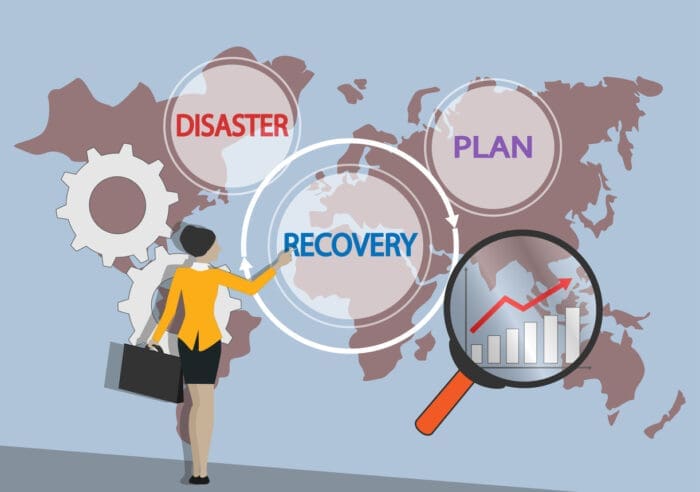In an unpredictable business landscape, preparedness is your strongest ally. Louis Pasteur famously said, 'Luck favors the prepared mind. ' This sentiment couldn't be more relevant to crisis management. Whether facing a sudden market downturn or a cybersecurity breach, the ability to respond swiftly and strategically can make the difference between resilience and ruin.
Key Takeaways
- Crisis management is essential for organizational resilience, involving proactive planning, risk assessment, and a robust response strategy to mitigate impacts during disruptions.
- An effective crisis management team, composed of experienced and diverse members, is critical for executing crisis plans successfully, with regular training and simulations to ensure readiness.
- A thorough business impact analysis and contingency planning are vital for prioritizing recovery strategies and maintaining operational continuity, while continuous improvement ensures that crisis management plans evolve with changing challenges.
Understanding Crisis Management Strategies
Crisis management is a critical component of organizational resilience. It involves a series of steps designed to address and navigate catastrophic events, ensuring that businesses can continue operating despite disruptions. The essence of crisis management lies in responding swiftly and effectively to unexpected, impactful problems, thereby safeguarding the organization’s interests.

A business impact analysis (BIA) is a fundamental part of the crisis management process. This analysis helps organizations understand how different crises can affect various business areas, including finance and security. Assessing potential risks helps businesses identify how disruptions might affect critical operations, enabling them to prioritize recovery strategies. Effective crisis management can prevent business-crushing disasters, making it essential for long-term success.
A well-thought-out crisis management plan ensures a swift and coordinated response during a crisis. This proactive approach can turn a potential major catastrophe into a minor setback. Understanding the importance of such a plan and identifying potential crises helps businesses build a solid foundation for resilience.
Importance of a Crisis Management Plan
A crisis management plan is a lifeline for any business, preserving its image, brand, and overall success during turbulent times. Without such a plan, businesses risk losing trust, facing confusion during crises, and experiencing delays in response. With nearly 59% of businesses having faced a crisis, the necessity of being prepared cannot be overstated.

A comprehensive crisis management plan mitigates the impact of poorly handled crises and ensures a swift recovery. Proactive crisis communication helps protect employees and operations, demonstrating a higher resilience. 89% of executives consider crisis management a strategic priority, reflecting its critical role in business continuity.
Since 54% of businesses have a proactive crisis management plan, preparedness is crucial.
Identifying Potential Crises
Identifying potential crises is the first step toward effective crisis management.
Natural disasters, terrorist attacks, and global financial crises are some of the catastrophic events that businesses must be prepared for.

Additionally, common preventable crises such as:
- product recalls
- stolen data
- false accusations
- the loss of key executives
can also negatively impact a business’s reputation.
Businesses should evaluate both universal and industry-specific threats to manage potential crises proactively. Implementing strong cybersecurity measures can significantly reduce the risk of data breaches.
Maintaining supply chain integrity involves developing alternate sourcing strategies and diversifying suppliers to enhance resilience against disruptions.
Building an Effective Crisis Management Team

An effective crisis management team is the backbone of any crisis response strategy, especially in situations marked by poor crisis management. This team must be well-structured to handle unexpected incidents efficiently.
The success of a crisis management plan depends on the people executing it, so selecting and training team members is vital.
Selecting Key Team Members
Choosing the right members for the crisis management team is vital. Key members should have leadership experience, stay calm under pressure, and possess unique expertise. A diverse skill set, including empathy-trained HR personnel, can enhance the team’s effectiveness.
Experienced leaders and individuals with diverse skills form the foundation of a strong crisis management team.
Training and Simulations
Regular training sessions and drills ensure crisis management team members understand their roles and the crisis management plan. Kicking off training with senior management emphasizes its significance, reinforcing the importance of business continuity planning. Common tests include tabletop exercises, structured walk-throughs, and simulations, which help expose plan gaps and illustrate misalignment of priorities.
Organizations typically test their business continuity plans twice to four times yearly to ensure readiness. Crisis simulations involve mock exercises, training days, and scenario simulations to prepare teams for real situations.
These simulations are crucial for determining if staff can perform critical functions during a disaster and establishing clear communication protocols to share information swiftly during a crisis.
Crafting a Robust Crisis Communication Strategy

Communication is the lifeline of effective crisis management. A robust crisis communication strategy ensures that all messaging is consistent and clear across different platforms during a crisis. Regular reviews of crisis communication plans are critical to keep them relevant and effective.
Training communication teams to respond coherently to various scenarios ensures a consistent message.
Designating a Company Spokesperson
Having a designated spokesperson is crucial for clarity and consistency in communication during a crisis. This spokesperson plays a vital role in managing public perception and delivering timely updates to stakeholders, ensuring that the company’s response is coordinated and effective.
Stakeholder feedback is valuable for assessing the effectiveness of communication and coordination during a crisis.
Utilizing Social Media Channels
Social media channels are vital for managing public relations during a crisis, enabling direct communication with stakeholders. Southwest Airlines, for example, established a social media team to monitor and respond to customer inquiries during a crisis. Social media can quickly disseminate key information and address public questions.
Post-crisis, companies like Southwest Airlines have changed their online imagery and marketing strategies to rebuild trust and align with their updated branding. These strategies help maintain customer confidence and facilitate effective public relations, which is crucial for navigating crises successfully.
Conducting a Thorough Business Impact Analysis

A comprehensive business impact analysis (BIA) helps organizations prioritize recovery strategies by revealing the potential impacts of disruptions on various functions. The BIA process includes evaluating financial and operational impacts from potential disruptions to prioritize recovery efforts.
Gathering information for a BIA often involves interviews and surveys to identify key business processes and their interdependencies.
Evaluating Critical Business Functions
Evaluating critical business functions is the initial step in building a business continuity plan. This assessment includes an inventory of key processes, supporting components, and risks. Prioritizing essential business processes is crucial for maintaining continuity during a crisis.
Regularly assessing supply chain vulnerabilities is also important for minimizing the impact of disruptions.
Setting Recovery Time Objectives
Setting Recovery Time Objectives (RTOs) ensures a business can resume operations swiftly after an incident. These objectives dictate how long a business can be non-operational following a disruption.
Determining RTOs and Recovery Point Objectives (RPOs) involves considering various factors, including regulatory standards and the nature of the business. These recovery objectives should align with customer expectations and contractual obligations to maintain trust and service continuity.
Developing Contingency Plans for Various Scenarios

Developing contingency plans based on insights from risk assessments is essential for addressing potential crises. These plans should be tailored to various scenarios, ensuring businesses are prepared for disruptions.
Contingency plans should be continuously evaluated and improved based on lessons learned from past crises.
Addressing Technological Crises
Technological crises, such as cyberattacks and data breaches, represent significant threats to business operations. Effectively handling these crises requires businesses to create and implement contingency plans addressing the unique challenges of cyber threats. Conducting a comprehensive business impact analysis allows organizations to evaluate critical functions and prioritize recovery efforts during a technological crisis.
Identifying essential business functions ensures operational continuity during a crisis, enabling businesses to focus resources on the most critical areas affected by technological failures.
Mitigating Supply Chain Disruptions
Supply chain vulnerabilities can severely impact business operations, making it essential to understand potential risks. Developing contingency plans to address potential supply chain disruptions helps ensure operational continuity.
Continuously evaluating and improving these plans based on lessons from past supply chain disruptions is essential.
Ensuring Continuous Improvement
Continuous improvement is a cornerstone of effective crisis management. Organizations should regularly evaluate and refine their crisis management plans to meet evolving challenges. Regular updates ensure these plans remain effective and aligned with organizational goals.
Post-Crisis Evaluation
Post-crisis evaluation analyzes key metrics like crisis response time, impact on business operations, and stakeholder engagement. Surveys and feedback sessions can gather insights from stakeholders.
These evaluations help identify areas for improvement and ensure that the crisis management plan evolves with each incident.
Implementing Lessons Learned
Implementing lessons learned from past crises strengthens future crisis management strategies. Comprehensive reviews and stakeholder feedback help enhance agility and adaptability in future responses.
Documenting insights from previous crises ensures that these lessons inform and improve future planning.
Summary
In summary, effective crisis management involves understanding potential crises, building a strong team, crafting robust communication strategies, and continuously improving plans through regular evaluations and lessons learned. By implementing these strategies, businesses can navigate crises confidently and sustainably, ensuring long-term success.
Remember, the goal is not just to survive a crisis but to emerge stronger. Proactive planning, continuous improvement, and effective communication are key. Equip your business with these strategies and be prepared for whatever challenges come your way.
Frequently Asked Questions

What is the importance of a crisis management plan?
A crisis management plan is essential for protecting a business's image and brand during turbulent times. It enables a swift and coordinated response to mitigate damage and ensure continuity.
How can businesses identify potential crises?
Businesses can identify potential crises by evaluating universal and industry-specific threats, such as natural disasters and data breaches while implementing strong cybersecurity measures and alternative sourcing strategies to manage these risks effectively.
Why is it important to have a designated company spokesperson during a crisis?
Having a designated company spokesperson during a crisis is crucial for maintaining clarity and consistency in communication, which helps manage public perception and provides timely updates to stakeholders. This strategic approach is essential for maintaining trust and transparency.
What role does social media play in crisis communication?
Social media is critical in crisis communication by enabling businesses to rapidly share important information and engage with the public, thereby preserving customer trust and enhancing public relations efforts during a crisis.
How can businesses ensure continuous improvement in their crisis management plans?
Businesses can ensure continuous improvement in their crisis management plans by regularly evaluating and refining them, conducting post-crisis evaluations, and implementing lessons learned from previous crises. This proactive approach enhances preparedness and strengthens response strategies.
Ready to Prepare Your Business for the Unexpected?
Don't wait for a crisis to strike—prepare your business now. By partnering with experts who understand the importance of strategic crisis management, you can safeguard your company’s future and turn potential threats into opportunities for growth.
Get Started with a Free Consultation!
Let’s discuss how our experience can help drive your business forward.
- Call me directly at 608-410-4450
- Submit a contact form: Contact Us
- Arrange a consultation: Schedule Now
Don’t leave your success to chance—partner with experts who know what it takes to win. Reach out today, and let’s start building a remarkable future for your business.
About the author
Mark A. Hope is the co-founder and Partner at Asymmetric Marketing, an innovative agency dedicated to creating high-performance sales and marketing systems, campaigns, processes, and strategies tailored for small businesses. With extensive experience spanning various industries, Asymmetric Marketing excels in delivering customized solutions that drive growth and success. If you’re looking to implement the strategies discussed in this article or need expert guidance on enhancing your marketing efforts, Mark is here to help. Contact him at 608-410-4450 or via email at mark.hope@asymmetric.pro.

